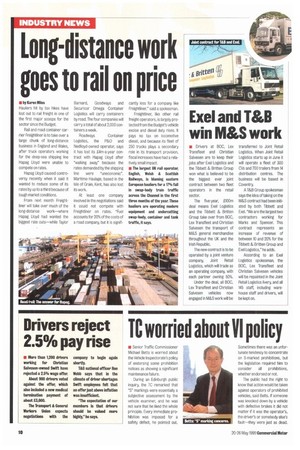Long-distance work goes to rail on price
Page 12

If you've noticed an error in this article please click here to report it so we can fix it.
• by Karen Miles Hauliers hit by tax hikes have lost out to rail freight in one of the first major scoops for the sector since the Budget.
Rail and road container carrier Freightliner is to take over a large chunk of long-distance business in England and Wales, after truck operators working for the deep-sea shipping line Hapag Lloyd were unable to compete on rates.
Hapag Lloyd caused controversy recently when it said it wanted to reduce some of its rates by up to a third because of tough market conditions.
From next month Freightliner will take over much of the long-distance work—where Hapag Lloyd had wanted the biggest rate cuts—while Taylor Barnard, Goodways and Securicor Omega Container Logistics will carry containers by road. The four companies will carry a total of about 2,000 containers a week.
Roadways Container Logistics, the P&O and Nedlloyd-owned operator, says it has lost its 1,4m-a-year contract with Hapag Lloyd after `‘walking away" because the rates demanded by the shipping line were "uneconomic". Maritime Haulage, based in the Isle of Grain, Kent, has also lost its work.
At least one company involved in the negotiations said it could not compete with Freightliner on rates. "Fuel accounts for 20% of the costs of a road company, but it is signifi cantly less for a company like Freightliner," said a spokesman.
Freightliner, like other rail freight operators, is largely protected from the Budget's vehicle excise and diesel duty rises. It pays no tax on locomotive diesel, and because its fleet of 250 trucks plays a secondary role in its transport provision, fiscal increases have had a relatively small impact.
• The largest UK rail operator, English, Welsh & Scottish Railways, is blaming eastern European hauliers for a 17% fall in swap-body train traffic across the Channel in the first three months of the year. These hauliers are operating modern equipment and undercutting swap-body, container and tank traffic, it says.




















































































































